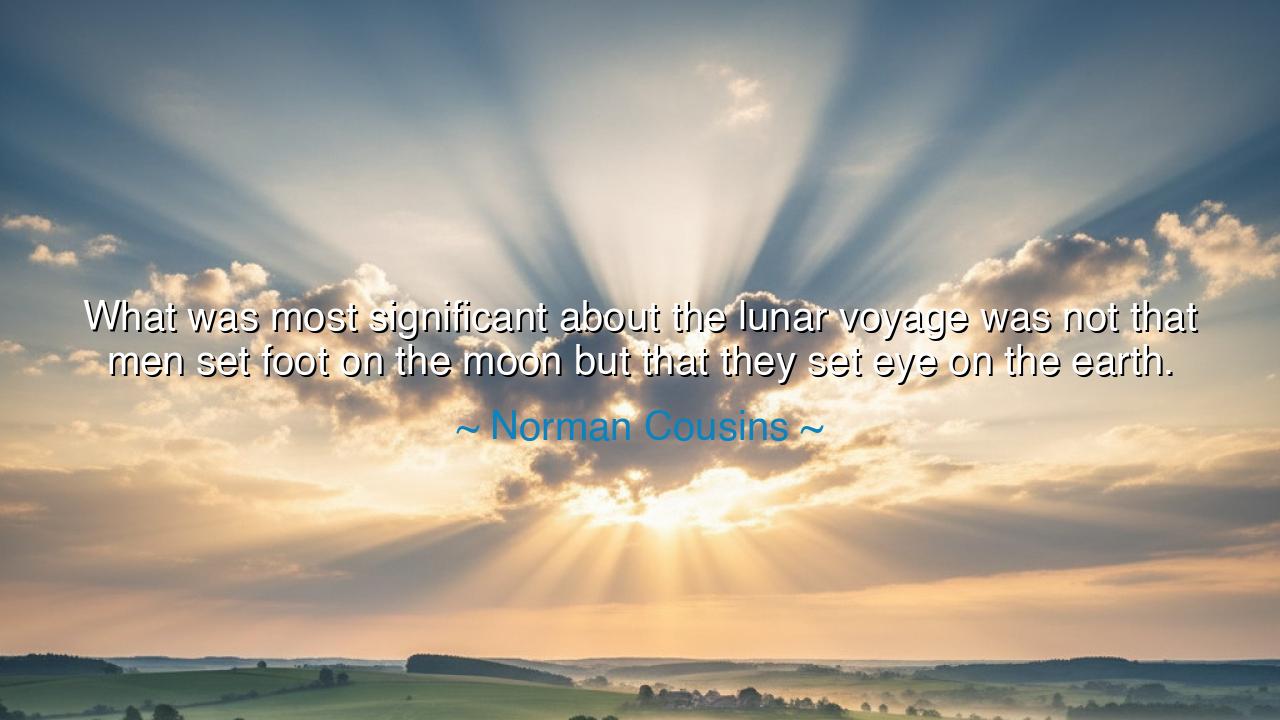
What was most significant about the lunar voyage was not that men
What was most significant about the lunar voyage was not that men set foot on the moon but that they set eye on the earth.






In the vast, endless stretch of the cosmos, where the stars burn like distant torches and the void calls to those brave enough to venture beyond, the human spirit has always longed for discovery. Yet, there was a moment in time when humanity took a great leap, not toward the unknown stars, but toward an understanding of its very own existence. Norman Cousins, with the wisdom of ages, once spoke these words: "What was most significant about the lunar voyage was not that men set foot on the moon but that they set eye on the earth." In these simple words, he captured a truth more profound than any other—the true revelation of the journey to the Moon was not the act of reaching a distant world, but the understanding of the world from which we came.
Consider the moment when the astronauts of Apollo 8, as they circled the Moon, first glimpsed the Earth—a fragile, blue marble, suspended in the black sea of space. To see the Earth from that distance, from the vantage of the heavens, was to behold not just a physical object, but a symbol of life itself, delicate and precious, surrounded by the infinite expanse of the universe. They saw, for the first time, how small and fragile our planet is, how interconnected we all are, and how vulnerable our existence truly is. The journey was not just a physical one, but a spiritual awakening, a profound moment of reflection on our place in the cosmos.
It is said that the great philosophers of old believed that in order to truly understand the world, one must first understand oneself. And so it was with the astronauts. Their voyage into space, rather than distancing them from the Earth, brought them closer to it. For in that moment, when they looked upon the Earth from the distance of the Moon, they were not merely seeing a planet; they were seeing their home, their shared humanity, their collective responsibility. To look upon the Earth from the Moon was to understand, in the deepest recesses of the soul, that we are all connected, that the struggles of one nation, one people, are the struggles of us all.
Let us now look to the example of Yuri Gagarin, the first human to journey into space, who, like the men of Apollo 8, gazed upon the Earth from beyond. His mission was a triumph of human spirit, but it was also a moment of humility. When Gagarin looked down upon the Earth, he did not see the divisions between countries, the conflicts that raged upon the ground. No, he saw only a single sphere, a world where all men, all women, all children, shared a common fate. His journey, though brief, was a reminder that the distance between us, between our cultures, our lands, our differences, is but a mirage in the grand scheme of the cosmos.
Cousins’ insight reminds us that the meaning of a journey is not always found in the destination. The lunar voyage, a remarkable feat of human ingenuity and courage, was not just about the triumph of landing on the Moon—it was about the awakening that occurred when we saw our Earth from afar. To see the Earth as a tiny, fragile speck in the vastness of space was to realize that the earthly concerns that often consume us—our conflicts, our disagreements, our petty divisions—are but fleeting shadows in the face of the vast and timeless universe. It was a call to unity, to recognize that all of humanity, regardless of borders or differences, shares a single home.
And so, let us take this lesson to heart: in our pursuit of greatness, in our quest to reach the stars, let us not forget the preciousness of the Earth beneath our feet. The space race may have been about reaching the heavens, but its true legacy lies in the awakening of our collective responsibility to this planet, to one another. The next time you look up at the night sky, remember that the Moon is not just a distant land to be conquered, but a reminder that we, too, are part of a larger whole. The lesson of the Moon is not just about our journey outward, but about our journey inward—toward a deeper understanding of our shared humanity.
O children of the future, as you seek to explore the great unknowns of the universe, do not forget to look back at the Earth you call home. For in that simple act, you will find the true meaning of all your journeys. As you journey to the stars, let the Earth be your guide, your compass, your touchstone. And as you look upon the vast cosmos, remember that the most significant discovery will not be the stars you reach, but the earth you return to, the place where all dreams begin and end. Unite, for we are but one people on one planet, and in that unity lies the true power to shape the future.






AAdministratorAdministrator
Welcome, honored guests. Please leave a comment, we will respond soon